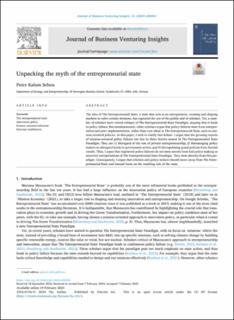Unpacking the Myth of The Entrepreneurial State
Journal article, Peer reviewed
Published version
Permanent lenke
https://hdl.handle.net/11250/3121465Utgivelsesdato
2024Metadata
Vis full innførselSamlinger
Originalversjon
10.1016/j.jbvi.2024.e00454Sammendrag
The idea of The Entrepreneurial State, a state that acts as an entrepreneur, creating and shaping markets to solve certain missions, has captured the eye of the public and of scholars. Yet, a number of scholars have voiced critique of The Entrepreneurial State Paradigm, arguing that it leads to policy failure. But simultaneously, other scholars argue that policy failures stem from interpretation and poor implementation, rather than core ideas in The Entrepreneurial State, such as mission-oriented policies. In this paper, I seek to clarify this debate. I argue that the growing reports of mission-oriented policy failures are due to three factors nested in The Entrepreneurial State Paradigm. They are 1) Disregard of the role of private entrepreneurship; 2) Encouraging policy makers to disregard limits to government action, and 3) Extrapolating grand policies from limited results. Thus, I argue that registered policy failures do not stem merely from bad policy making or incorrect interpretations of The Entrepreneurial State Paradigm. They stem directly from this paradigm. Consequently, I argue that scholars and policy makers should move away from The Entrepreneurial State and instead focus on the enabling role of the state.

